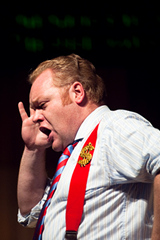| Opera Reviews | 10 May 2024 |
| Five:15
makes a welcome return by Catriona Graham |
|
| Five:15 Scottish Opera May 2010 |
|
|
The first year's collaboration between Ron Butlin and Lyell Cresswell was widely acclaimed, so it is unsurprising that the pair is working on a longer work, scheduled for next year. The Money Man comprises three scenes from this work-in-progress but also stands alone on its own merits. Set in the Stock Exchange and the home of the eponymous money man, Tom Masters, in September 2008, it is a love story and morality tale. Butlin's libretto is crisp and witty; Cresswell's score reflects that wit, teasing us by confounding our expectations - the opening line 'What a wonderful morning' is just not quite reminiscent of Richard Rodgers. It is quite lyrical, and the four characters - Masters (Martin Lamb), his daughter Laura (Arlene Rolph), loved by junior trader Steve (Alexander Grove), and gold-digging journalist Jenna (Louise Collett) - are differentiated musically. Steve, in particular, gains confidence, ending the opera with a triumphant last line. The Letter is the first adaptation in the series. Bernard MacLaverty's libretto is based on a chapter in Vasily Grossman's novel 'Life and Fate', about the Nazi invasion of Russia, and set to music by Vitaly Khodosh. Since the storyline concerns the movement of Jews first to the ghetto and then to death camp, Khodosh utilises the Yiddish soundscape of minor keys. In a mixture of arias and conversations with fellow Russians, whether Jews or not, Anna Semyonovna recounts the events leading to her death, in a letter to her absent son Vitya. Arlene Rolph's performance as Anna is mature and moving - this is a woman who acknowledges her fate without accepting it. It is also the only opera with a chorus, which somehow gives it a completeness. The set, with a menorah on which each member of the cast hangs a yellow star, is spare - books, plates, wood, pillows, the things they take to the ghetto from their homes. At the end, each plucks the star and burns it above the bucket which served to carry the possessions as the orchestra repeats a sparse, six-note pattern. Pete Stollery's electro-acoustic score combined with Paul Mealor's music creates the atmosphere for Peter Davidson's libretto in 74° North. Set in the Canadian Arctic, it tells of a scientist, Andrew, visiting the graves of John Franklin's crew seeking the Northwest Passage. While Andrew (Jeremy Huw Williams) soliloquises about the Arctic and his work, a stranger appears. When he moves, the sound is of ice-cracking. The two converse, about Rae, who led the search for Franklin - the stranger (Alexander Grove) is the ghost of one of Rae's crew. At times, the volume of sound overwhelms the singers. Also, it is not clear why the final words are spoken, rather than sung. The opening opera, Zen Story, pits Hakuin, a Zen Master (Dean Robertson) against a pregnant teenage girl and her parents. Their emotional responses contrast with his stillness - his musical lines are slow and calm and level, theirs have dynamics and the range. When the parents interrogate the girl (Miranda Sinani) about the father, she blurts out that it is Hakuin. Only later, when he has been given the child to bring up, does she confess it was not him and take the child back. Set in a rather 1950s Japan - Mount Fuji painting on the wall, samurai sword, music evoking temple bells - it is not clear why so much is spoken, rather than sung towards the end. In Sublimation, a Woman (Lee Bisset), out for a walk with her Son (Matthew Tollan) and her Sister (Miranda Sinani) experiences flashbacks to the rape which resulted in the birth of her child. Tied in a straitjacket to a stake, choreographer Kally Lloyd-Jones is Loti, a symbolic tree into which the Woman is ultimately absorbed, leaving her Child with her Sister. Lloyd-Jones' movement is expressive in its response to Nick Fells music and Zoë Strachan's libretto, providing a commentary on the Woman's words as well as reaching out to her. However, although the Woman has some lyrical passages, there is a shoutyness about much of the vocal scoring. Furthermore, there is an inevitability about the end - we can see it coming from the Woman's first words. Despite flowers being dropped in their midst during Sublimation, the orchestra plays this wide range of musical styles with verve. In a rather noisy performance space, conductor Derek Clark meets the challenge of the subdued chopper soundtrack at the start of Sublimation and the lower instruments setting the scene in 74° North and The Letter. There is no Five:15 in 2011. We'll miss it. |
|
| Photo:
© Tommy Ga Ken Wan Text: © Catriona Graham |

 If
it's spring, it must be Five:15 - Operas Made in Scotland. In
this, the third year of Scottish Opera's new work development project,
we are already seeing the fruits of this approach.
If
it's spring, it must be Five:15 - Operas Made in Scotland. In
this, the third year of Scottish Opera's new work development project,
we are already seeing the fruits of this approach. 





